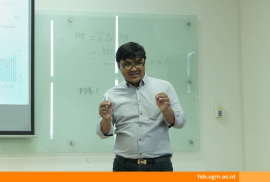The Faculty of Economics and Business, Universitas Gadjah Mada (FEB UGM), through the Spatial Research on Regional & Sustainability Economics Working Group (SpaRSE), is providing waste management assistance to residents living near the banks of the Code River, specifically in Sinduadi Village, Sleman Regency. This community engagement initiative exemplifies FEB’s commitment to developing programs with social impact.
Through the program called BISSA! (Berbagi Ilmu Sinduadi Sleman Asri), FEB’s UGM team assists residents with waste management and sorting. This support aims to help residents address waste management issues in their densely populated areas with limited access, making it difficult for waste collection services to reach them. As a result, many residents are forced to dump or burn waste on nearby land, increasing the risk of environmental pollution.
The BISSA program started in April 2024, led by FEB UGM faculty Qisha Quarina, S.E., M.Sc., Ph.D., and Dea Yustisia, S.E., MSc. together with Dr. Ir. Rachmawan Budiarto, S.T., M.T., IPU, a faculty member from the Faculty of Engineering. The program includes various activities such as community outreach, FGD, and waste management training.
To enhance the knowledge and understanding of the partner village, the FEB UGM team and the partner village residents conducted a comparative study visit to the 3R TPS KUPAS (Waste Management Business Group) in Panggungharjo Village, Bantul Regency on Monday, October 28, 2024. This visit served as a platform for discussion on waste management, where the BISSA team and three participating residents learned about the waste sorting and processing system in KUPAS, which they hope can be adopted by the residents of Sinduadi.
Wahyu Trisna Jati, S.I.Kom, the public relations officer of KUPAS Panggungharjo, explained that KUPAS is a 3R (Reduce, Reuse, Recycle) waste management facility operated under the Village-Owned Enterprise (BUMDes), which was initiated in 2013 by the then village head Wahyudi Anggoro Hadi. KUPAS now manages approximately 30% of Panggungharjo’s waste, with a maximum capacity of 8-10 tons daily. To support operations at the central waste facility, smaller facilities at the neighborhood level help collect waste from residents’ homes. “Under KUPAS, there are waste management facilities at the neighborhood level. We receive three types of waste: organic, inorganic, and residual waste,” Wahyu explained.
He explained that the management of organic waste in Panggungharjo is delegated to the residents. However, KUPAS helps by converting it into maggot feed for farmers in Kulonprogo if the residents cannot process it themselves. Inorganic waste, on the other hand, is kept clean and ready for sale. Residual waste, such as baby diapers, sanitary napkins, and coffee packaging, is incinerated, and the resulting ash is used as a fertilizer mix.
Wahyu also discussed the waste bank system at KUPAS and the gold savings program in collaboration with Pegadaian. The waste bank program encourages waste management at the source, while the gold savings program encourages residents to bring waste to KUPAS. This program allows the community to convert their waste savings into gold.
BISSA Program Manager Qisha Quarina, S.E., M.Sc., Ph.D., expressed hope that BISSA in Sinduadi will raise public awareness about waste management. “We hope that the waste management program in Sinduadi will create awareness starting from the smallest unit, the household. Changing the household will create a ripple effect upwards, and this bottom-up approach is one of the easiest ways to create change,” she said.
Meanwhile, Dewi Ratna, S.Pd., a kindergarten teacher and resident of BISSA Sinduadi, expressed concern about waste management issues in her village, noting that awareness is still low and many still burn or dump it in the river. “With this program, I hope our village can set a good example for waste management in Sleman Regency, much like Panggungharjo serves as a model in Bantul Regency,” she said.
This visit will provide new insights for BISSA Sinduadi Village and the BISSA team. Through the collaboration between the local community and UGM’s BISSA team, this initiative hopes to contribute to the Sustainable Development Goals (SDGs) number 4 (quality education), 11 (sustainable cities and communities), and 12 (responsible consumption and production).
Reportage: Najwah Ariella Puteri
Editor: Kurnia Ekaptiningrum
Sustainable Development Goals








